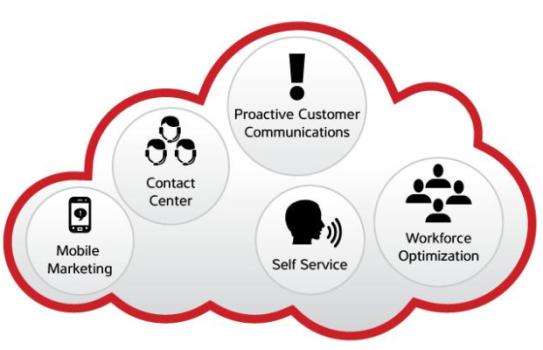Most major leading corporations and enterprises have adopted cloud-based software, particularly omnichannel strategies, to facilitate seamless communicate with customers across all messaging platforms.
At least half of all businesses have started to use cloud contact software. This means that if you have recently reached out to a representative via a text chat box or called tech support, you have likely communicated with an agent making use of cloud software.

The advantages of cloud computing are now well documented, with agent productivity, customer loyalty, and faster response times increasing thanks to more effective communication. Simply put, the widespread implementation of cloud contact centers has revolutionized the way customers interact with companies. But what exactly is a cloud contact center and why should your company be using it in 2019?
Organization, efficiency, and stronger communication
The main reason why a large number of companies are switching to cloud-based strategies is due to connectivity and responsiveness. Cloud-based systems are data-driven, putting the power back in the hands of agents. With omnichannel software, such as that offered by Bright Pattern, customers are never required to input information more than once, as their information is stored across multiple channels of communication. If a call is dropped or a connection is broken, a customer’s information is easily re-accessed by an agent.
This type of intuitive, data-driven software allows for seamless communication in a call center setting, and eliminates the potential for technical difficulties that disrupt a customer’s positive experience. Voice calls, email engagements, and “chatbots” all allow for distinctly personal interaction. Call routing and predictive dialing are two features of an omnichannel system that cannot be found in any other system.
Representatives and agents who provide customer support to numerous individuals a day can easily forget important details or become overwhelmed. This is why data-driven technology that encompasses all messaging platforms is necessary to ensure that human error does not interfere with what should be a positive, efficient, and hassle-free conversation between a customer and representative. A problem can quickly be resolved when information is readily at hand.
Matters become even more complicated when agents operate remotely, but cloud storage eliminates some of the concerns that may arise when dealing with remote operators. 83 percent of all cloud-based contact centers are more likely to have a system in place to evaluate remote agent productivity.
Advantages outweigh the disadvantages
Cloud computing is still relatively new technology, and as such, it remains a source of anxiety for some people who misunderstand how it works or believe that it is less secure than other information storage strategies. IT executives remain resistant due to fear of the unknown, yet even small corporations are replacing conventional systems with cloud-based software to reach their customer base with more ease and accessibility.
In 2008, only a small percentage of companies were using cloud-based software. In fact, the numbers were so low as to be statistically insignificant. However, in only a decade, midsize and large-scale businesses have adopted cloud-based systems en masse. This change likely came about due to a combination of factors, including an increased openness to technological change.
By the mid-2010s, distrust of the cloud had lessened slightly, with more and more companies reasoning that cloud contact centers appealed to customers’ needs more effectively and increased productivity. Cloud computing is actually significantly more secure than traditional IT systems. With 2020 on the horizon and more than half of all businesses storing sensitive information in the crowd, it is likely that cloud-based resources will soon become the new normal.







